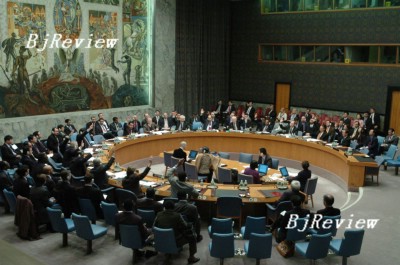
Starting from this year, China's share of the UN budget is increased to 2.67 percent, or more than $40 million annually, for the next three years, up considerably from the previous 2.05 percent.
While noting that the increase was an indication of China's growing economic power, experts and leading Chinese media stressed that UN member countries should only pay what they can afford.
In recent years, China's UN dues have been constantly on the rise. Its assessment soared from 0.995 percent in 2000 to 1.54 percent for 2001-2003 and 2.053 percent for 2004-06, representing a 107 percent rise in four years.
Regarding the latest increase, the official newspaper People's Daily commented that it was a natural adjustment reflecting China's growing economic strength. "China, as a member of the UN community and a permanent member of the UN Security Council, is aware of its responsibilities to the UN as well as world peace and security and is committed to meeting its financial obligations to the UN," it said.
Pang Sen, Vice President of United Nations Association of China, said he believes the trend is evidence of the ever-growing expectations that the international community has placed on an emerging China.
According to him, this "membership fee" is only a portion of China's financial contribution to the UN. It also contributes funds to the international criminal tribunals for Rwanda and the former Yugoslavia. Still bigger contributions go toward UN peacekeeping, which is largely funded by the permanent members of the Security Council.
Pang said China's payments to the UN totaled $189 million in 2006, only $35 million of which represented the membership fee.
As China's assessment for the UN's regular budget rises, it will also have to pay more to cover other UN expenses, such as those of its agencies and peacekeeping missions, he predicted.
"However, it should not be forgotten that China has a very large population, a rather weak economic base and a lot of problems still to be resolved at a domestic level," People's Daily cautioned.
In 2005, China's per-capita gross domestic product (GDP) was $1,700, far lower than the world average of $5,094. The country still has 23 million people living on $1 a day, the World Bank's poverty line. The newspaper therefore noted that China still faces the monumental task of developing its economy, eliminating poverty and modernizing.
Even so, China is willing to contribute to the United Nations as long as consideration is given to what each country can actually afford, it said.
A point of contention
The recent assessment scale adjustments triggered heated debates within the UN. As many as 16 proposals were presented. Some countries wanted to set a minimum rate for the permanent members of the Security Council, replacing the principle of affordability with that of responsibility. Others believed that member countries should pay according to their GDP, regardless of per-capita income and the size of the population below the poverty line. Given the divisiveness of the issue, People's Daily underlined the importance of a fair and just scale of assessments.
The current method of determining assessments was adopted in 2000, when the General Assembly based individual countries' assessments on their gross national income, with adjustments for external debt and low per-capita income. The apportionment of the assessments is reviewed every three years, and must be completed by the end of December so the UN can send the bills to governments in early January.
People's Daily pointed out that China supports this method of calculation and maintains that the "capacity to pay" principle should be upheld. It said China is opposed to any policy that runs counter to the UN Charter or jeopardizes the interests of developing countries and the friendly cooperation among UN members.
In fact, politically motivated, discriminatory proposals have proven unacceptable to most UN members, as evidenced by the General Assembly's decision to stick to the current method of calculation over the next three years, it noted.
The newspaper said adjustments of UN dues are inevitable as the economies of its member countries develop, and disputes over this issue will persist. It asserted that China would consider all proposals that are in line with the "capacity to pay" principle, not politicized and conducive to the efficient functioning of the UN and to world peace.
Under the recently passed new formula, the United States will continue to be the largest contributor from 2007-2009, with its assessment accounting for 22 percent of the UN's annual budget. Japan's dues will drop from 19.4 percent of the total UN budget to 16.6 percent.
Germany, which ranks third after the United States and Japan in dues, will pay 8.57 percent; Britain, 6.64 percent; and France, 6.3 percent.
Like China, Russia, a permanent member of the Security Council, will also see an increase in its UN dues, from 1.1 percent to 1.2 percent of the world body's total budget.
| 